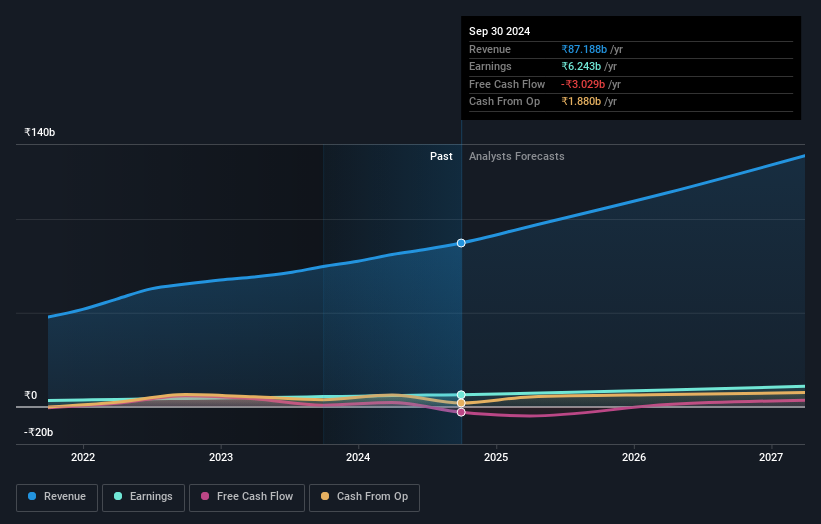While KEI Industries Limited (NSE:KEI) might not have the largest market cap around , it saw a double-digit share price rise of over 10% in the past couple of months on the NSEI. The recent rally in share prices has nudged the company in the right direction, though it still falls short of its yearly peak. With many analysts covering the mid-cap stock, we may expect any price-sensitive announcements have already been factored into the stock’s share price. However, could the stock still be trading at a relatively cheap price? Let’s examine KEI Industries’s valuation and outlook in more detail to determine if there’s still a bargain opportunity.
View our latest analysis for KEI Industries
What's The Opportunity In KEI Industries?
KEI Industries is currently expensive based on our price multiple model, where we look at the company's price-to-earnings ratio in comparison to the industry average. We’ve used the price-to-earnings ratio in this instance because there’s not enough visibility to forecast its cash flows. The stock’s ratio of 62.64x is currently well-above the industry average of 51.42x, meaning that it is trading at a more expensive price relative to its peers. In addition to this, it seems like KEI Industries’s share price is quite stable, which could mean two things: firstly, it may take the share price a while to fall back down to an attractive buying range, and secondly, there may be less chances to buy low in the future once it reaches that value. This is because the stock is less volatile than the wider market given its low beta.
Can we expect growth from KEI Industries?

Future outlook is an important aspect when you’re looking at buying a stock, especially if you are an investor looking for growth in your portfolio. Although value investors would argue that it’s the intrinsic value relative to the price that matter the most, a more compelling investment thesis would be high growth potential at a cheap price. KEI Industries' earnings over the next few years are expected to increase by 57%, indicating a highly optimistic future ahead. This should lead to more robust cash flows, feeding into a higher share value.
What This Means For You
Are you a shareholder? It seems like the market has well and truly priced in KEI’s positive outlook, with shares trading above industry price multiples. At this current price, shareholders may be asking a different question – should I sell? If you believe KEI should trade below its current price, selling high and buying it back up again when its price falls towards the industry PE ratio can be profitable. But before you make this decision, take a look at whether its fundamentals have changed.
Are you a potential investor? If you’ve been keeping tabs on KEI for some time, now may not be the best time to enter into the stock. The price has surpassed its industry peers, which means it is likely that there is no more upside from mispricing. However, the optimistic prospect is encouraging for KEI, which means it’s worth diving deeper into other factors in order to take advantage of the next price drop.
With this in mind, we wouldn't consider investing in a stock unless we had a thorough understanding of the risks. You'd be interested to know, that we found 1 warning sign for KEI Industries and you'll want to know about it.
If you are no longer interested in KEI Industries, you can use our free platform to see our list of over 50 other stocks with a high growth potential.
Valuation is complex, but we're here to simplify it.
Discover if KEI Industries might be undervalued or overvalued with our detailed analysis, featuring fair value estimates, potential risks, dividends, insider trades, and its financial condition.
Access Free AnalysisHave feedback on this article? Concerned about the content? Get in touch with us directly. Alternatively, email editorial-team (at) simplywallst.com.
This article by Simply Wall St is general in nature. We provide commentary based on historical data and analyst forecasts only using an unbiased methodology and our articles are not intended to be financial advice. It does not constitute a recommendation to buy or sell any stock, and does not take account of your objectives, or your financial situation. We aim to bring you long-term focused analysis driven by fundamental data. Note that our analysis may not factor in the latest price-sensitive company announcements or qualitative material. Simply Wall St has no position in any stocks mentioned.
About NSEI:KEI
KEI Industries
Manufactures, markets, and sells wires and cables in India and internationally.
Flawless balance sheet with proven track record.
Similar Companies
Market Insights
Community Narratives


Recently Updated Narratives


Alphabet: The Under-appreciated Compounder Hiding in Plain Sight


MINISO's fair value is projected at 26.69 with an anticipated PE ratio shift of 20x


The Quiet Giant That Became AI’s Power Grid
Popular Narratives


The company that turned a verb into a global necessity and basically runs the modern internet, digital ads, smartphones, maps, and AI.


MicroVision will explode future revenue by 380.37% with a vision towards success



